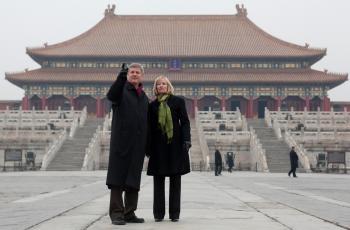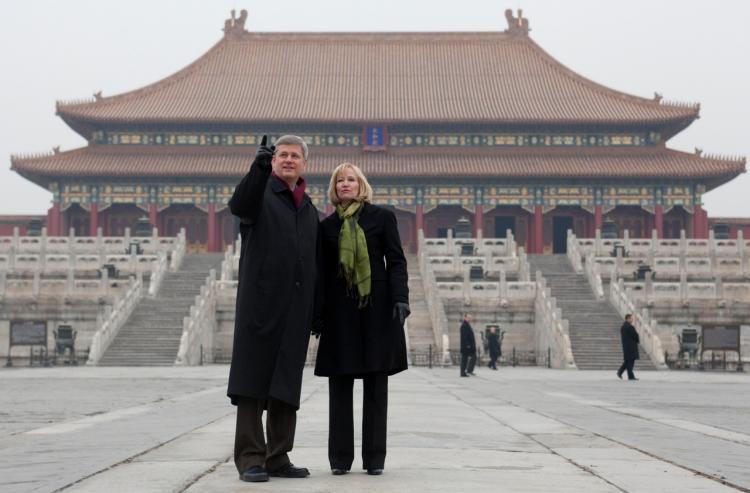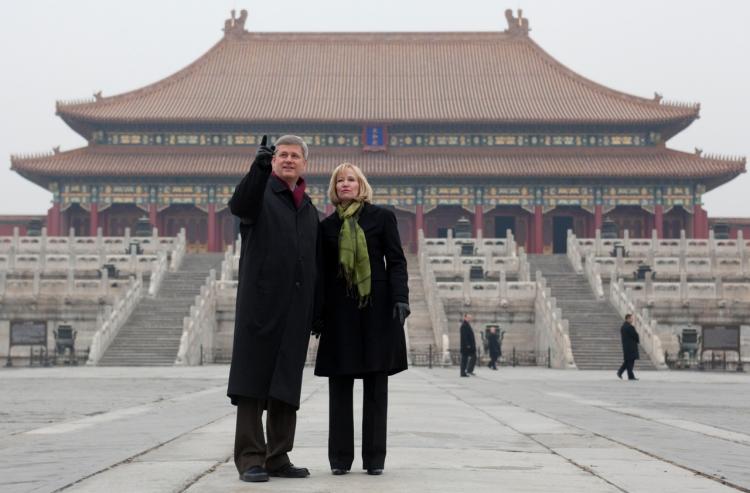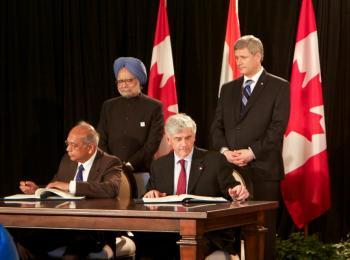Canadian Prime Minister Stephen Harper’s first visit to China did not change his views of the country, according to an interview he gave an ethnic media reporter who travelled with him.
Mr. Harper told the reporter that “although this is the first time he visited China, it did not change the view of China he’s had all along,” according to an account of the interview published in the Chinese-language Sing Tao newspaper.
The Sing Tao report summarized Harper’s comments and did not provide direct quotes. According to the article, Harper said China’s economic development had “made him feel he needs to strengthen the relationship between Canada and China.”
But at the same time Harper “emphasized that he would not waver on core values of human rights and democracy that Canada values.”
A slew of minister-level trips to China promoting trade combined with relative quiet on the human rights front had some concerned that the government was slowly abandoning its support for human rights in China in favour of trade ties.
Harper’s comments on the China trip appeared to suggest that though the government will pursue trade, it is digging its heels in on the issue of human rights.
“Our government believes and has always believed that a mutually beneficial economic relationship is not incompatible with a good and frank dialogue on fundamental values like freedom, human rights, and the rule of law,” Harper announced at a business dinner in Shanghai on Friday night.
“And so in relations between China and Canada, we will continue to raise issues of freedom and human rights, be a vocal advocate and an effective partner for human-rights reform, just as we pursue the mutually beneficial economic relationship desired by both our countries.”
Then on Saturday in Hong Kong, Harper again turned to the topic of freedom and democracy.
“Ours is a country, that has always stood up when the cause has been just, a country that has never flinched in a fight no matter how fierce the foe, and a country that has never wavered in its defence of freedom, democracy, and justice,” Harper was quoted saying at a remembrance event for Canadian soldiers who died defending Hong Kong from Japanese forces during World War II.
But aside from a promise to champion human rights, Mr. Harper did not name specific human rights issues in his public speeches in China.
On Friday, the Prime Minister’s Office confirmed to The Epoch Times that in meetings with the Chinese, Harper had raised the case of Huseyin Celil, a Canadian citizen imprisoned in China on charges that human rights groups say are highly suspect, while also raising other human rights issues. But a spokesperson for the PM could not confirm what those issues were.
Several groups in Canada had called on Harper to raise specifics human rights cases when travelling to China.
An all-party group of Canadian parliamentarians had asked Mr. Harper to raise the ongoing and often brutal persecution of Falun Gong adherents by the Chinese authorities.
And in November, the Canada Tibet Committee had written to Mr. Harper asking him to raise their “deep concern” with “human rights in Tibet, including but not limited to freedom of religion, expression and due process.”
Mr. Harper told the reporter that “although this is the first time he visited China, it did not change the view of China he’s had all along,” according to an account of the interview published in the Chinese-language Sing Tao newspaper.
The Sing Tao report summarized Harper’s comments and did not provide direct quotes. According to the article, Harper said China’s economic development had “made him feel he needs to strengthen the relationship between Canada and China.”
But at the same time Harper “emphasized that he would not waver on core values of human rights and democracy that Canada values.”
A slew of minister-level trips to China promoting trade combined with relative quiet on the human rights front had some concerned that the government was slowly abandoning its support for human rights in China in favour of trade ties.
Harper’s comments on the China trip appeared to suggest that though the government will pursue trade, it is digging its heels in on the issue of human rights.
“Our government believes and has always believed that a mutually beneficial economic relationship is not incompatible with a good and frank dialogue on fundamental values like freedom, human rights, and the rule of law,” Harper announced at a business dinner in Shanghai on Friday night.
“And so in relations between China and Canada, we will continue to raise issues of freedom and human rights, be a vocal advocate and an effective partner for human-rights reform, just as we pursue the mutually beneficial economic relationship desired by both our countries.”
Then on Saturday in Hong Kong, Harper again turned to the topic of freedom and democracy.
“Ours is a country, that has always stood up when the cause has been just, a country that has never flinched in a fight no matter how fierce the foe, and a country that has never wavered in its defence of freedom, democracy, and justice,” Harper was quoted saying at a remembrance event for Canadian soldiers who died defending Hong Kong from Japanese forces during World War II.
But aside from a promise to champion human rights, Mr. Harper did not name specific human rights issues in his public speeches in China.
On Friday, the Prime Minister’s Office confirmed to The Epoch Times that in meetings with the Chinese, Harper had raised the case of Huseyin Celil, a Canadian citizen imprisoned in China on charges that human rights groups say are highly suspect, while also raising other human rights issues. But a spokesperson for the PM could not confirm what those issues were.
Several groups in Canada had called on Harper to raise specifics human rights cases when travelling to China.
An all-party group of Canadian parliamentarians had asked Mr. Harper to raise the ongoing and often brutal persecution of Falun Gong adherents by the Chinese authorities.
And in November, the Canada Tibet Committee had written to Mr. Harper asking him to raise their “deep concern” with “human rights in Tibet, including but not limited to freedom of religion, expression and due process.”





